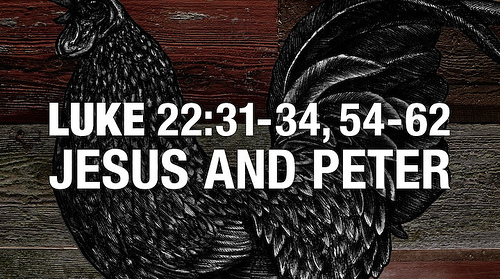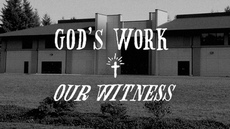 From the Sept. 25 sermon, "Jesus and Peter," preached by Pastor Mark out of Luke 22:31-34; 54-62:
From the Sept. 25 sermon, "Jesus and Peter," preached by Pastor Mark out of Luke 22:31-34; 54-62:
Jesus knows who will fail him, and when, where, and how. He knows that all of us will fail him, even the best among us—including Peter, who wrote books of the Bible and was the senior leader of Jesus’ disciples. After Peter fails Jesus, he weeps bitterly and repents quickly, as should we. The good news is Jesus fails no one; he is faithful. He restores his friendship with Peter and then encourages him to tell his story in order to strengthen others.
We have failed Jesus. Peter has failed him. Some of you failed him last night. Some of you failed him last week. Some of you failed him last month. Some of you failed him last year, and some of you are here today, smugly, proudly declaring in your heart, "I’m glad it’s not me." Wait ‘til tomorrow. Jesus knows when you will fail him. How do you feel about that fact? Here’s how Peter felt: Luke 22:62, "And he went out and wept bitterly." Have you had that day? Peter is a grown man. Grown men don’t cry a lot, but when confronted with the depth of their sin, it is a righteous thing for a man to be broken. And Peter here, if you could just get the picture, he had just denied him. "I don’t know Jesus! . . . There he is, looking me in the eye, hearing everything I’ve just said, as he’s going to suffer, and I denied him." I could just see Peter’s face in his hands, just weeping, bawling bitterly, uncontrollably. "What have I done? What have I failed to do?" […] It’s horrible, isn’t it? The best among us failed, failed miserably, failed publicly, failed shamefully. And if this were all we had in the Bible, if this were where the story ended, it would be completely devastating, utterly depressing. But the reason it’s so dark is all we’ve talked about is Peter and us. See, we haven’t talked about Jesus yet.
Jesus is not just another therapist. He’s not just another counselor. He’s not just another professor, or a teacher, or an author who gives good advice. He’s a good God and Savior who died and rose to give good news, and the good news is we all failed God, and God fails none of his children. That’s good news! […] If you’re not a Christian, Mars Hill is not about giving you good advice, but good news. Jesus forgives sinners. Jesus pursues sinners. Jesus loves sinners! Jesus changes sinners! And you’re welcome, you’re welcome, you’re welcome to follow him! Friends, it doesn’t matter what you’ve done. You are not beyond the good news. And I tell you this. Some of you are going to sin in the future, and you’re going to have that bitter weeping moment, and you’re not beyond the good news. See, I have complete hope for you—not in you, but for you. You can depend on Jesus, especially when you’ve failed him, because Jesus fails who? No one. That’s amazing.
Jesus asks [Peter] three times, "Do you love me?" Why does he ask him that question? Because sin is not just the breaking of God’s laws. It’s the breaking of Jesus’ heart. When you sin, you’re sinning against your friend. You’re sinning against a God who loves you. You’re sinning against a God who wants to do life with you. You’re sinning against a God who calls you by name and treasures you as a friend. And so when Jesus asks him, "Do you love me?" he is in essence teaching Peter, "If you love me, you’re not going to lie. If you love me, you’re not going to deny me. If you love me, you’re not going to be a coward. If you love me, you’re going to live for the glory of God, not for the approval of others." See, friends, all of your problems and mine really come down to two things: We don’t really believe that Jesus loves us, and we don’t really love him. And even if we do, sometimes, in a moment, we choose otherwise, and that’s why we sin. So, the key to overcoming sin is a friendship with Jesus. Right? It’s a friendship with the real living God, who’s not just an idea, but a person, a person named Jesus, who loves us. Next up, Luke #92, "Jesus, Tough and Tender."














